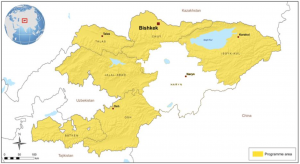The Kyrgyz forests face severe degradation due to overharvesting for use as fuel wood (mainly managed by women) and housing construction. The country’s fragile mountain topography, combined with depletion of forest cover, results in wind and water soil erosion on sloping lands. Other interrelated problems relate to risks of landslides, mudflows and flooding due to poor storage basin management, unsustainable use of water resources and deterioration of water quality due to sedimentation. The intensity of erosion is primarily due to water-runoff, soil sedimentation and harmful agricultural practices utilized on sloping land.
The Kyrgyz forestry sector confronts other threats as well. The lack of timber imports into the country, overgrazing on forested lands and the steady growth of population, all put increasing pressure on Kyrgyz forests. Over the last thirty years, forest cover has been reduced by at least 50 percent. Intensive livestock grazing has had a significant effect on forests, with almost one million ha of forestland being used for grazing. Pastures are overgrazed in the low and middle altitudes due to inappropriate herd management and stocking rates.
The project goal is to contribute to rural poverty alleviation in the country through increased climate resilience, incomes and gender-sensitive growth in rural farming communities. The proposed Regional Resilient Pastoral Communities Project – ADAPT promotes climate-adaptive resilience through a targeted approach to reduce rangeland and forest degradation and to actively improve the condition of these interlinked ecosystems. The project will mainstream participatory, sustainable, forest and rangeland management for the stakeholders in the forests and rangelands of Kyrgyzstan.
This project upscales the lessons learned and best practices from a number of preceding projects namely the IFAD LMDP I & II and ATMP projects; the World Bank / GEF – IFEMP; FAO / GEF – Sustainable management of mountainous forest and land resources under climate change conditions; the GIZ Ecosystem-based Adaptation to Climate Change in High Mountainous Regions of Central Asia; and the IFAD BALI pilot.
The AF will target around 23 Pasture User Unions (PUUs) to improve the climate-resilience of their pastures. The RRPCP-Adapt will target Leskhozes in climate-vulnerable areas that were not targeted by the World Bank Integrated Forest Ecosystem Management Project (IFEMP) project. Given that PUUs generally comprise between 850 and 1,000 member households (with an average size of 5.3 persons per household), IFAD assumes a total outreach of 109,710 persons (20,700 households), of which 50% will be women.
The project area will focus on the rural PUU areas identified as being climate-vulnerable and provinces where the regional level of poverty is higher. RRPCP-Adapt will thus work in areas characterized by a high concentration of poor or high poverty rates and high vulnerability to climate change.
| Project Component 1: Capacity development to integrate climate change adaptation and gender equity for resilient ecosystems and livelihoods | US$ 221,000 |
| Project Component 2: Climate-adaptive investments in forest and rangeland rehabilitation | US$ 5,010,000 |
| Project Component 3: Climate-resilient alternative income development | US$ 3,407,063 |
| Project execution cost | US$ 577,894 |
| Total project cost | US$ 9,215,957 |
| IFAD Project Cycle Management Fee | US$ 783,356 |
| Grant Amount | US$ 9,999,313 |
Project Documents
| Attachment | Type | Size |
|---|---|---|
| Project document | 5 MB |


